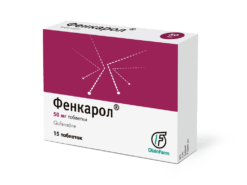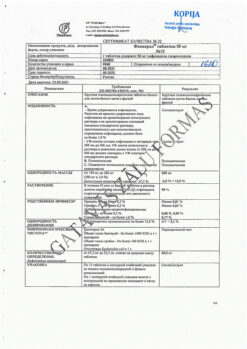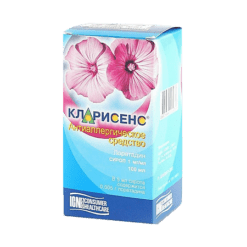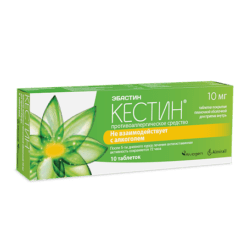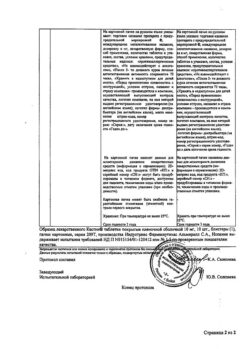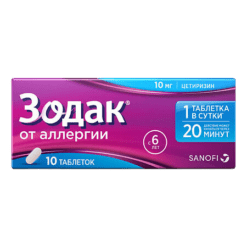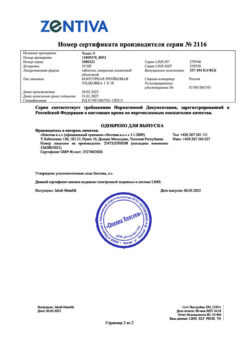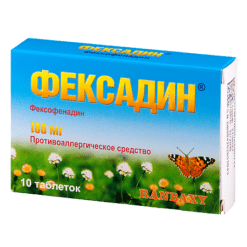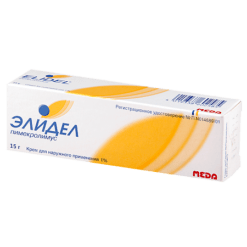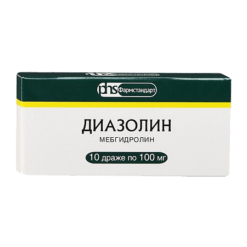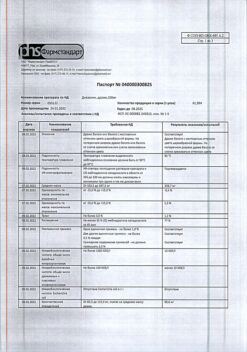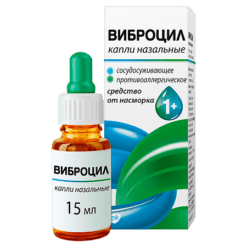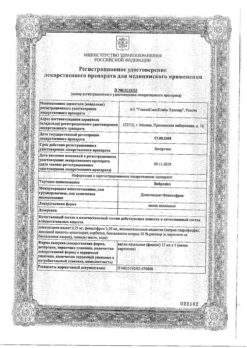No products in the cart.
Description
Cetirizine is a competitive histamine antagonist, a metabolite of hydroxyzine, blocks H1-histamine receptors. It prevents the development and facilitates the course of allergic reactions, has antipruritic and antiexudative effects. It affects the early stage of allergic reactions, limits the release of inflammatory mediators at the later stage of the allergic reaction, reduces the migration of eosinophils, neutrophils and basophils. It reduces capillary permeability, prevents the development of tissue edema, relieves smooth muscle spasm.
It eliminates the skin reaction to the introduction of histamine, specific allergens and also to cooling (with cold urticaria). It has practically no anticholinergic and antiserotonin action. In therapeutic doses there is practically no sedative effect. Onset of action after a single dose of 10 mg of cetirizine is within 20 minutes (in 50% of patients) and 60 minutes (in 95% of patients), and lasts more than 24 hours. During a course of treatment, tolerance to the antihistamine action of cetirizine does not develop. After discontinuation of treatment the action lasts up to 3 days.
Pharmacokinetics
It is quickly absorbed from the gastrointestinal tract, time to reach Cmax after oral administration – 1 hour. Food does not affect the completeness of absorption (AUC), but prolongs by 1 hour the time to reach Cmax and reduces the Cmax value by 23%. When administered at a dose of 10 mg once daily for 10 days, the equilibrium plasma concentration is 310 ng/ml and is noted 0.5-1.5 hours after administration. The binding to plasma proteins is 93% and does not change at cetirizine concentrations in the range of 25-1000 ng/ml.
The pharmacokinetic parameters of cetirizine change linearly when administered at a dose of 5-60 mg. Vd is 0.5 l/kg. In small amounts it is metabolized in the liver by O-dealkylation to form pharmacologically inactive metabolite (unlike other H1-histamine receptor blockers, which are metabolized in the liver involving the cytochrome P450 system). It does not cumulate. 2/3 of the drug is excreted unchanged by the kidneys and about 10% – through the intestine.
Systemic clearance is 53 ml/minute. T1/2 in adults is 7-10 hours, in children 6-12 years – 6 hours, in children 2-6 years – 5 hours, in children from 6 months to 2 years – 3 hours. In elderly patients T1/2 is increased by 50%, systemic clearance is decreased by 40% (decreased renal function).
In patients with impaired renal function (creatinine clearance below 40 ml/min) the drug clearance decreases and T1/2 is prolonged (so, in patients on hemodialysis total clearance decreases by 70% and is 0.3 ml/min/kg, and T1/2 is prolonged by 3 times), which requires appropriate changes in dosing regimen.
In patients with chronic liver disease (hepatocellular, cholestatic or biliary cirrhosis) a prolongation of T1/2 by 50% and reduction of total clearance by 40% are observed (dosage regimen adjustment is required only in concomitant decrease of glomerular filtration rate). It penetrates into the breast milk.
Indications
Indications
– seasonal and year-round allergic rhinitis and conjunctivitis (itching, sneezing, rhinorrhea, lacrimation, conjunctival hyperemia);
– urticaria (including chronic idiopathic urticaria);
– hay fever (hay fever);
– itching;
– angioedema (Quincke’s edema);
– itchy allergic dermatoses.
Pharmacological effect
Pharmacological effect
Cetirizine is a competitive histamine antagonist, a metabolite of hydroxyzine, and blocks H1-histamine receptors. Prevents the development and facilitates the course of allergic reactions, has antipruritic and antiexudative effects. Affects the early stage of allergic reactions, limits the release of inflammatory mediators at the late stage of the allergic reaction, reduces the migration of eosinophils, neutrophils and basophils. Reduces capillary permeability, prevents the development of tissue edema, relieves spasm of smooth muscles.
Eliminates skin reactions to the introduction of histamine, specific allergens, as well as to cooling (with cold urticaria). It has virtually no anticholinergic and antiserotonin effects. In therapeutic doses it practically does not cause a sedative effect. The onset of action after a single dose of 10 mg of cetirizine is after 20 minutes (in 50% of patients) and after 60 minutes (in 95% of patients), lasting more than 24 hours. During a course of treatment, tolerance to the antihistamine effect of cetirizine does not develop. After stopping treatment, the effect lasts up to 3 days.
Pharmacokinetics
Rapidly absorbed from the gastrointestinal tract, the time to reach Cmax after oral administration is 1 hour. Food does not affect the completeness of absorption (AUC), but prolongs the time to reach Cmax by 1 hour and reduces Cmax by 23%. When taken at a dose of 10 mg 1 time/day for 10 days, the equilibrium concentration in plasma is 310 ng/ml and is observed 0.5-1.5 hours after administration. Plasma protein binding is 93% and does not change with cetirizine concentrations in the range of 25-1000 ng/ml.
The pharmacokinetic parameters of cetirizine change linearly when administered at a dose of 5-60 mg. Vd – 0.5 l/kg. In small quantities, it is metabolized in the liver by O-dealkylation to form a pharmacologically inactive metabolite (unlike other H1-histamine receptor blockers, which are metabolized in the liver with the participation of the cytochrome P450 system). Does not cumulate. 2/3 of the drug is excreted unchanged by the kidneys and about 10% through the intestines.
Systemic clearance – 53 ml/minute. T1/2 in adults – 7-10 hours, in children 6-12 years old – 6 hours, in children 2-6 years old – 5 hours, in children from 6 months to 2 years – 3 hours. In elderly patients, T1/2 increases by 50%, systemic clearance decreases by 40% (decreased renal function).
In patients with impaired renal function (creatinine clearance below 40 ml/min), the clearance of the drug decreases, and T1/2 is prolonged (for example, in patients on hemodialysis, the total clearance is reduced by 70% and is 0.3 ml/min/kg, and T1/2 is extended by 3 times), which requires a corresponding change in the dosage regimen.
In patients with chronic liver diseases (hepatocellular, cholestatic or biliary cirrhosis), an increase in T1/2 by 50% and a decrease in total clearance by 40% are observed (adjustment of the dosage regimen is required only with a concomitant decrease in glomerular filtration rate). Passes into breast milk.
Special instructions
Special instructions
Concomitant use with alcohol and drugs that depress the central nervous system is not recommended.
Impact on the ability to drive vehicles and operate machinery:
During the treatment period, it is necessary to refrain from engaging in potentially hazardous activities that require increased concentration and speed of psychomotor reactions.
If the dose exceeds 10 mg/day, the ability to react quickly may deteriorate.
Active ingredient
Active ingredient
Cetirizine
Composition
Composition
1 film-coated tablet contains:
Active ingredient:
cetirizine dihydrochloride 10 mg.
Contraindications
Contraindications
– decreased renal function (creatinine clearance 30-49 ml/min);
– chronic renal failure;
– children under 6 years of age;
– pregnancy;
– lactation period;
– hypersensitivity to cetirizine, other components of the drug, hydroxyzine.
With caution: old age (possibly decreased glomerular filtration rate).
Side Effects
Side Effects
Cetirizine is usually well tolerated. Side effects are rare and transient.
From the digestive system: dry mouth, dyspepsia.
From the nervous system: dizziness, headache, drowsiness, fatigue, agitation, migraine.
Allergic reactions: angioedema, skin rashes, itching, urticaria.
Interaction
Interaction
Combined use with theophylline (400 mg/day) leads to a decrease in the overall clearance of cetirizine (theophylline kinetics does not change).
Myelotoxic drugs increase the manifestations of hematotoxicity of the drug.
No clinically significant interactions were found with other drugs (pseudoephedrine, cimetidine, ketoconazole, erythromycin, azithromycin, diazepam, glipizide).
Overdose
Overdose
Symptoms: taking the drug once in a dose of over 50 mg may be accompanied by signs of intoxication in the form of drowsiness, anxiety and increased irritability; signs of anticholinergic action may appear in the form of urinary retention, dry mouth, constipation.
Treatment: induce vomiting, rinse the stomach, take activated charcoal, consult a doctor immediately.
There is no specific antidote.
Hemodialysis is ineffective.
Storage conditions
Storage conditions
In a place protected from light, at a temperature of 2-25°C.
Manufacturer
Manufacturer
Danafa Pharmaceutical Joint, Vietnam
Additional information
| Conditions of storage | In a light-protected place at 2-25°C. |
|---|---|
| Manufacturer | Danafa Pharmaceutical Joint, Vietnam |
| Medication form | pills |
| Brand | Danafa Pharmaceutical Joint |
Related products
Buy Cetirizine DC,10 mg 10 pcs with delivery to USA, UK, Europe and over 120 other countries.


